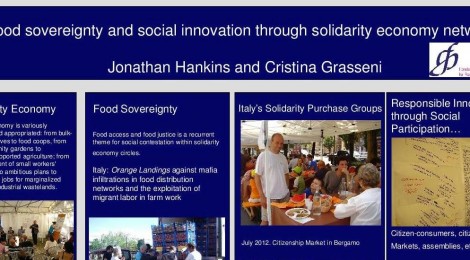
Food Sovereignty and Social Sustainability Through Solidarity Economy Networks
This year’s INSS conference included many really exciting attendees, and we were fortunate that many presented their current projects in our poster session. Jonny Hankins blogged about the work he presented at the conference for the Bassetti Foundation, Technology Bloggers, and Utrecht Central.
Jonathan Hankins and Cristina Grasseni
This project examines how specific kinds of economic engagement can also be forms of active citizenship, with the potential for both economic sovereignty and social sustainability. Solidarity economy is variously interpreted and appropriated: from bulk-buying collectives to food coops, from urban community gardens to community-supported agriculture; from the development of small workers’ cooperatives to ambitious plans to create “green” jobs for marginalized youth in postindustrial wastelands. Based on a one-year project funded by the Wenner Gren Foundation for Anthropological Research and previous research (Grasseni Beyond Alternative Food Networks, Bloomsbury 2013), the poster presentation focused on provisioning activism – a phenomenon that is growing transnationally, often without reciprocal knowledge or coordination.
The project developed from Grasseni and Hankins’ involvement with the GAS (gruppi di acquisto solidale or solidarity-based purchase groups) network in Italy, and Grassini’s research with this group:
We participated in the national conferences and saw the difficulties faced in scaling up such an approach. Once in the USA we became interested in food provisioning again and this led on to cooperative energy production and all of the other various types of so-called alternative provisioning. This led to a request for funding for Cristina to conduct a comparative study between the growth in Lombardy and that in Massachusetts, granted by the Wenner Gren Foundation.
On the basis of ethnographic observation, the poster focuses on similarities and differences, limits and potentials of social and solidarity economies in Lombardy (Italy) and Massachusetts (USA): investment on food justice and youth empowerment, participatory guarantee systems, attempts at re-localizing entire food supply chains.
 They argue that social and solidarity economies can help widen our understanding of the concept of sovereignty in relation to provisioning, especially in the light of recent literature on “food sovereignty” and “food democracy”. Food access and food justice is a recurrent theme for social contestation within solidarity economy circles. The poster analyzes the interplay of multiple anthropological issues in the way the concept of “sovereignty” is appropriated by food activists: including trust, representation, and collective ownership. The key finding of the poster is that there is more to sustainable innovation than the top down approach that is currently favoured. What they would like to do is think about how a scaling up from the grass roots might be possible, whether some kind of process of learning from others can be facilitated.
They argue that social and solidarity economies can help widen our understanding of the concept of sovereignty in relation to provisioning, especially in the light of recent literature on “food sovereignty” and “food democracy”. Food access and food justice is a recurrent theme for social contestation within solidarity economy circles. The poster analyzes the interplay of multiple anthropological issues in the way the concept of “sovereignty” is appropriated by food activists: including trust, representation, and collective ownership. The key finding of the poster is that there is more to sustainable innovation than the top down approach that is currently favoured. What they would like to do is think about how a scaling up from the grass roots might be possible, whether some kind of process of learning from others can be facilitated.
Hankins and Grasseni are headed to the Netherlands next to examine another case study for comparison.
More information about the project can be found here: http://www.fondazionebassetti.org/en/focus/2014/04/the_bassetti_foundation_is_ple.html
Jonny Hankins is Foreign Correspondent for the Bassetti Foundation for Responsible Innovation, and is also on the Editorial Board of the Journal of Responsible Innovation published by Taylor & Francis, and participating through the Bassetti Foundation in the Virtual Institute for Responsible innovation and the Integrated Network for Social Sustainability. More information is on his personal website: http://about.me/jonnyhankins
Cristina Grasseni is Associate Professor of Anthropology at Utrecht University. http://www.uu.nl/staff/CGrasseni/0
This post was developed from Hankins’ poster abstract and answers to interview questions by email. Please post any questions in the comments.


